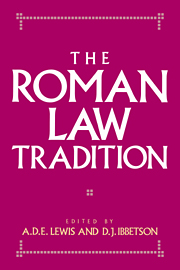Book contents
- Frontmatter
- Contents
- List of contributors
- Foreword: Peter Stein, Regius Professor of Civil Law in the University of Cambridge, 1968–1993
- List of abbreviations
- 1 The Roman law tradition
- 2 Labeo and the fraudulent slave
- 3 Doing and causing to be done
- 4 The danger of definition: contrectatio and appropriation
- 5 Going to the fair – Jacques de Révigny on possession
- 6 Bembo giureconsulto?
- 7 Gentilis and the interpretatio duplex
- 8 Ius gentium in the practice of the Court of Admiralty around 1600
- 9 Stair's title ‘Of Liberty and Servitude’
- 10 The actio communi dividundo in Roman and Scots law
- 11 Sale and transfer of title in Roman and Scots law
- 12 ‘What Marcellus says is against you’: Roman law and Common law
- 13 Audi et alteram partem: a limit to judicial activity
- Index of sources
- Index of names and subjects
11 - Sale and transfer of title in Roman and Scots law
Published online by Cambridge University Press: 08 October 2009
- Frontmatter
- Contents
- List of contributors
- Foreword: Peter Stein, Regius Professor of Civil Law in the University of Cambridge, 1968–1993
- List of abbreviations
- 1 The Roman law tradition
- 2 Labeo and the fraudulent slave
- 3 Doing and causing to be done
- 4 The danger of definition: contrectatio and appropriation
- 5 Going to the fair – Jacques de Révigny on possession
- 6 Bembo giureconsulto?
- 7 Gentilis and the interpretatio duplex
- 8 Ius gentium in the practice of the Court of Admiralty around 1600
- 9 Stair's title ‘Of Liberty and Servitude’
- 10 The actio communi dividundo in Roman and Scots law
- 11 Sale and transfer of title in Roman and Scots law
- 12 ‘What Marcellus says is against you’: Roman law and Common law
- 13 Audi et alteram partem: a limit to judicial activity
- Index of sources
- Index of names and subjects
Summary
People who sell goods are by and large interested in obtaining payment of the price for them. The law provides various methods. Most legal systems find little difficulty with the case where the buyer is in possession of the goods but refuses to pay for them. Other questions are harder. How much protection (if any) should be given to a third party who is in possession of those goods in good faith? Should an unpaid seller have a better claim to his goods than any other creditor of the buyer?
In an essay to celebrate Professor Stein's first forty years or so of contributions to the study of Roman law and the Roman law tradition, it seems not inappropriate to discuss some problems arising in the contract of sale; to deal with Roman and Scots law side by side; and to consider a question where the application of a regula iuris may help to explain why things were done in one way in Rome but in quite another in Edinburgh.
This essay has little to say about the all sums retention of title clauses which are so prominent in commerce (and litigation) today. Since it deals with the law before the Sale of Goods Act 1893, it is in a sense concerned with the prehistory of those clauses.
- Type
- Chapter
- Information
- The Roman Law Tradition , pp. 182 - 198Publisher: Cambridge University PressPrint publication year: 1994

